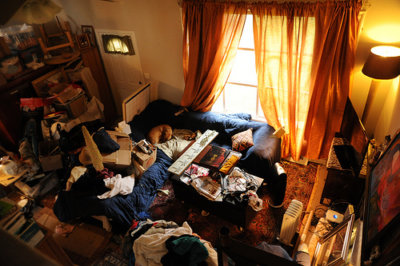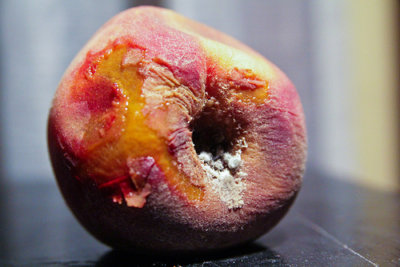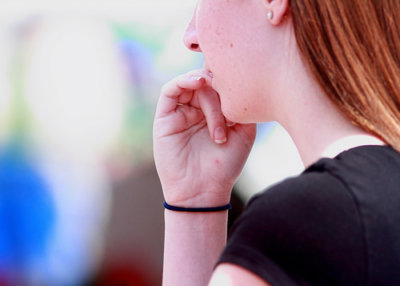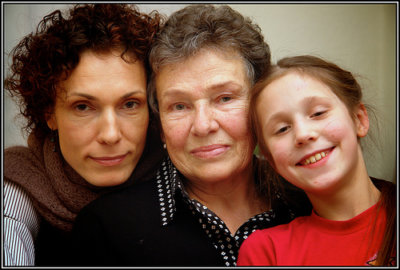My Mother the Compulsive Hoarder – a Case Study

By: Wonderlane
Hoarding affects approximately 2-5% of the population and has previously been considered a symptom of obsessive-compulsive disorder (OCD).
But recent research has found that hoarding is an independent disorder.
[Worried you or a loved one might be a hoarder? Read the facts and symptoms in our piece on Hoarding Disorder.]
So what is it like to live with a hoarder? Read one woman’s story of growing up the child of a hoarder.
When your parent is a hoarder
When asked how often I visit my mother, I tend to mutter something about how far away it is. How can I admit the real reason? That it isn’t the distance, but that there is literally no room for us to stay. And I’m not talking about spare bedrooms, either, because there are some of those.
My mum is a hoarder.
It feels a bit odd to say the word hoarder even now. Probably because for thirty years of my life I didn’t have a word for it or even know there was one, let alone that it was a mental health issue or a disorder. I just knew growing up that our house was a mess. Make that Mess, capital M.
Nobody seemed to understand
Its funny the responses I used to get if I did try to explain to someone that I grew up with a parent who was a hoarder. Things like, “Oh yeah I know, my dad collected old copies of Melody Maker.” No. Collecting back issues of a magazine doesn’t make you a hoarder. Having a neatly dusted cabinet of trinkets doesn’t make you a hoarder.
Having entire rooms in your house that you can’t even go into because they are piled high with rubbish, with papers and boxes and clothes? That makes you a hoarder. As does a landing with piles of empty picture frames, odd teacups, a random ball of wool, and mismatched shoes.
I tried to pretend things were fine
At times, I could convince myself we were normal. When we ate dinner, we cleared and set the table just like a regular family.

By: Steven Depolo
It’s just that there was so much stuff on the table to start with it was transferred to the settee while we ate.
And then there was the smell. Our house always stunk like dirty dish cloths and abandoned food. That’s because it was dirty, and because there was food left out to rot. You’d find it left under a bed or on a sideboard. I remember a hard boiled egg just sitting abandoned on the floor once, and fresh fruit that had become dried fruit of its own accord.
Having a mother who was a hoarder affected my sense of self
As a kid, did I care? Absolutely. I was ashamed, embarrassed, and generally mortified. People from school would come round occasionally and I would scoot around beforehand, helpless, wondering how I could make it look somehow normal. I’d watch my father do the same thing, laughing when people came by and saying things like, “Oh, you just caught us mid-mess!”
My father would distract himself with going to work, digging the garden, and playing golf. And me? I tried to be a normal kid. But I did spend more time crying in my room than was normal.
I couldn’t have friends over
I got to the age the embarrassment meant I just wouldn’t have anyone over ever, not if I could help it. But it did create problems. I had this amazing best friend, she used to invite me to stay at her house virtually every Friday. I loved that she had clean bedding, that the house smelled of potpourri, I loved helping with the washing up in the morning. I loved it being a normal family house.

By: Pabak Sarkar
But she repeatedly asked if she could stay at my house and every time I made ridiculous excuses, which always sounded like lies (because they were).
I managed to avoid having her over for an entire two years, but she eventually tired of asking and our friendship waned.
I look back and think, she probably heard the rumours anyway. But back then, it was important to me she never see the chaos that was my home.
I began to challenge my Mother about being a hoarder
When I got old enough I began to challenge my mother on the state of the house, and she would say she was happy with it the way it was. It was her house, and she could do what she liked. I remember asking her how she could be happy living in filth and she said, “What the hell do you know about how I feel?” And I guess I didn’t know how she felt. I didn’t understand her at all.
Eventually, I dropped it. And then I was an adult leading my own life in my own (very clean and tidy!) house, with a busy life, and I tried not to let it affect me.
Now and again, though, I would meet a fellow child-of-a-hoarder. I remember the first time it happened. The girl had started to tell me why she didn’t get on with her mother and she said, embarrassed, that there was a word for the condition. We both ended up in tears because it’s one of those disorders that doesn’t get talked about much.
I realised I wasn’t alone
And a couple of years ago I read a book called Dirty Secret: A Daughter Comes Clean about Her Mother’s Compulsive Hoarding, the memoir of a fellow child of a hoarder. I cried all the way through.The writer identified a few other characteristics shared by her mother and mine (such as clumsiness) that I hadn’t read about elsewhere. Suddenly, everything fell into place.

By: Rolands Lakis
Coming to terms with the idea that my mother has a mental health problem was extremely liberating for me. It doesn’t mean that I can help her if she isn’t willing to be helped) but knowing she has a problem has enabled me to feel empathy.
So many TV shows about being a hoarder…
Nowadays the TV programmes about hoarders have started. I confess I was fascinated and addicted at first to watch other people experience things like I had. Of course then the American versions started and they seem very extreme, with people who are recluses and have houses so stuffed with things they can’t open the door.
While such shows are interesting, I think it overlooks that it doesn’t have to be that over the top for a family and loved ones to suffer.
When every episode of such shows ends with some sort of resolution it makes me a little sad. I just know that is not possible with my mother. Why? The people in these shows know they have a problem and want to live in a nicer home.
My mother doesn’t want to change, but I do
My mother not only would never go on such a show, she still to this day insists she doesn’t have a problem. She isn’t interested in help for hoarders.
Sadly, it does mean that she rarely sees her grandchildren because until they are much older I don’t want them rattling round in her house, picking up goodness knows what off the floor. She comes to us but, like many hoarders it seems, she’s not hugely comfortable out of her comfort zone. And I admit that when she is over I spend the entire time tidying up, desperate to show I am not like her, which probably doesn’t help.
What has changed is that I’ve accepted things. I realise that my mother is seventy, it’s time for me to believe her when she tells me she is happy the way she is. I’ve learned that we can’t change someone else, and that only they can decide they have a problem.
While I can’t change my mother, I’ve realised what I do have power over is myself and my life, and if I had one piece of advice, it would be to accept support instead of suffering in silence. Nowadays there are great resources for children of hoarders, such as the charity Help For Hoarders and the American site Children Of Hoarders.
I encourage anyone going through what I did to use such sites and forums. And consider hiring a coach or counsellor that can help you make sense of their experience. Just because you grew up in a mess? No longer means you have to feel a mess about it.
Do you have a parent who is a hoarder? Want to share your best advice for handling it, or ask a question about hoarding? Do so below.




